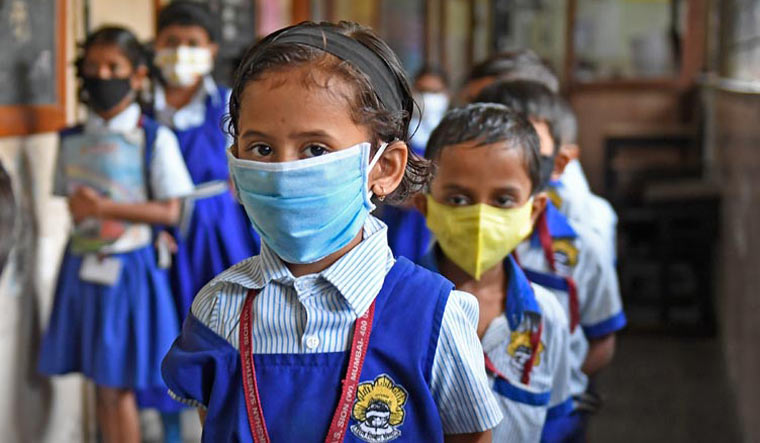Healthcare and education of children have suffered considerably across the country during the lockdown meant to curb the COVID-19 spread, a rapid online survey conducted by children's organisation Child Rights and You (CRY) has found.
One of the most concerning aspect is that almost 50 per cent of the children under the age of five years in the surveyed families were deprived of crucial immunisation services--something that could adversely impact their health in the long term, the study has shown.
The online survey was rolled out between April 10 and 20 on social media platforms Twitter, WhatsApp and LinkedIn and received as many as 1,102 responses from 23 states and Union territories. The findings were shared through a webinar on Tuesday.
As high as 63 per cent of the surveyed households in the northern states reported the lack of access to immunisation services, followed by western India with 39 per cent; while less than a third (33 per cent) of the respondents reported inaccessibility to immunisation from other regions.
One in every four (27 per cent) four of the respondents, the parents or primary caregivers, reported non-accessibility of regular healthcare services for children during the lockdown-–highest from the North (31 per cent), followed by the South (21 per cent). In other regions, lack of access to regular healthcare facilities was experienced by less than 20 per cent of the parents.
Even though children have not been the face of this pandemic as they have largely been spared of the direct health effects of COVID-19 so far, findings of the study indicate that they have been among its biggest victims with multiple side-effects on their physical and psycho-social well-being, the CRY said.
Apart from healthcare, access to education was affected considerably during the lockdown days. Three in every four (77 per cent) of the respondents have reported that the lockdown has affected education and learning. This was again the highest in the North (87%) and least in the West (56%).
Almost 60 per cent families pointed out that their kids' extra-curricular opportunities were impacted while another 60 per cent said that children’s friendships and social lives were affected. Almost an equal section (59 per cent) perceived that children’s outdoor games and recreational opportunities were majorly compromised.
More importantly, according to 37 per cent of the respondents, children’s psychological well-being and happiness have definitely been affected during this phase.
A major concern emerged as 88 per cent of the families reported an increase in their children’s exposure to online activities (screen time), amongst which 45 per cent reported the increase to a great extent. Only 43 per cent of the parents reported about being able to watch their children’s online activity continuously.
The webinar to share the study included a session with experts like Dr Raj Bhandari, (Member of National Technical Board of Nutrition and Health), Rekha Sharma Sen (Faculty of Child Development at IGNOU), Swagata Raha (legal researcher and child protection specialist) and Rubina Maiti (state education officer – UNICEF, UP). The panel was moderated by Puja Marwaha, CEO of CRY.
Marwaha said, “In a country where 40 per cent of the total population are children, and the budget allocated for them is just over 3 per cent of the outlay, it is but obvious that they do not emerge as priority while the country battles a pandemic. However, this most vulnerable section of the society has been one of the worst affected by the side-effects of COVID-19. To be able to address this, and to be better prepared to support the marginalised children during and after the lockdown, we conducted the online survey to understand how the lockdown has affected their physical and mental health, nutrition, education, protection and online security issues.”
'Ensure essential healthcare services, help parents monitor kids'
One of the major recommendations of the study and expert panelists is to ensure essential child healthcare services through a combination of measures where the local governance can play a significant role.
Also, to keep children healthy (both physically and psychologically), parents should be provided with tools and techniques to monitor children’s behaviour and nutrition intake, and support if they notice any alarming change. The situation of the poor and semi-poor households must be taken into account especially while planning and executing mitigation strategies, with a special focus on children, the study suggests.
The study also recommends online or virtual education through more systemic arrangements and logistical preparedness and to make it inclusive for the children who are still beyond the digital reach.



